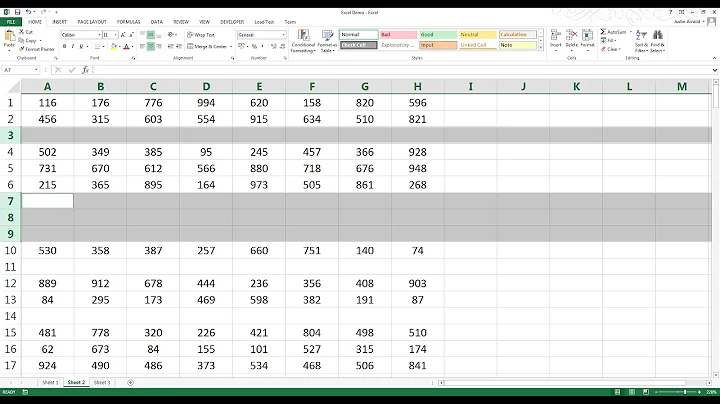How to remove empty/blank lines from a file in Unix (including spaces)?
Solution 1
This sed line should do the trick:
sed -i '/^$/d' file.txt
The -i means it will edit the file in-place.
Solution 2
grep
Simple solution is by using grep (GNU or BSD) command as below.
-
Remove blank lines (not including lines with spaces).
grep . file.txt -
Remove completely blank lines (including lines with spaces).
grep "\S" file.txt
Note: If you get unwanted colors, that means your grep is aliases to grep --color=auto (check by type grep). In that case, you can add --color=none parameter, or just run the command as \grep (which ignores the alias).
ripgrep
Similar with ripgrep (suitable for much larger files).
Remove blank lines not including lines with spaces:
rg -N . file.txt
or including lines with spaces:
rg -N "\S" file.txt
See also:
- How to remove blank lines from a file (including tab and spaces)?
- With
sed: Delete empty lines using sed - With
awk: Remove blank lines using awk
Solution 3
sed '/^$/d' file.txt
d is the sed command to delete a line. ^$ is a regular expression matching only a blank line, a line start followed by a line end.
Solution 4
You can use the -v option with grep to remove the matching empty lines.
Like this
grep -Ev "^$" file.txt
Solution 5
Here is an awk solution:
awk NF file.txt
With Awk, NF only set on non-blank lines. When this condition match, Awk default action is to print the whole line.
Related videos on Youtube
Khan
Updated on September 18, 2022Comments
-
Khan over 1 year
How do I remove empty/blank (including spaces only) lines in a file in Unix/Linux using the command line?
contents of file.txt
Line:Text 1:<blank> 2:AAA 3:<blank> 4:BBB 5:<blank> 6:<space><space><space>CCC 7:<space><space> 8:DDDoutput desired
1:AAA 2:BBB 3:<space><space><space>CCC 4:DDD-
 Admin about 9 yearsFor awk, see: Remove blank lines in awk, or using grep, in general, see: How to remove blank lines from a file in shell?
Admin about 9 yearsFor awk, see: Remove blank lines in awk, or using grep, in general, see: How to remove blank lines from a file in shell? -
 Admin about 6 years
Admin about 6 years -
 Admin about 5 yearsThis is an epic answer that pretty much gives every possible solution using grep, sed, awk: stackoverflow.com/questions/16414410/…
Admin about 5 yearsThis is an epic answer that pretty much gives every possible solution using grep, sed, awk: stackoverflow.com/questions/16414410/…
-
-
MShoubaki about 13 yearsIt actually needs to be "/^ *$/d" to remove lines that only contain spaces.
-
 kasperd about 8 years@SeanReifschneider That requirement was not in the question when this answer was written?
kasperd about 8 years@SeanReifschneider That requirement was not in the question when this answer was written? -
mrswadge over 6 years@SeanReifschneider Would "/^\s*$/d" not be better as it would include tabs? Whilst it's not mentioned in the original post, it seems a stronger option to me.
-
Trevor Boyd Smith about 6 years
-
Leo about 6 years
grep .seems to be the simplest solution. -
 Govind Kailas about 5 yearsIf you want to skip the commented and blank lines, especially while dealing with conf files use
Govind Kailas about 5 yearsIf you want to skip the commented and blank lines, especially while dealing with conf files usegrep -Ev '^#|^$' file.txt -
ishandutta2007 about 5 yearsI get
bad flag in substitute command: 'e' -
wisbucky about 5 yearsThe downside of
grep .compared to the other solutions is that it will highlight all the text in red. The other solutions can preserve the original colors. Compareunbuffer apt search foo | grep .tounbuffer apt search foo | grep -v ^$ -
kenorb about 5 years@wisbucky You see colors, because
grepis aliased togrep --color=autoon your system (check by:type grep). You can run it as\grepor use--color=noneparameter. -
wisbucky about 5 years@kenorb If you use
grep --color=none ., you will get all white text, which overrides the color formatting of the original command (example:apt search foo) -
 Jim L. almost 5 years
Jim L. almost 5 yearsgrep .will match lines containing only spaces, which the OP says is not desired. -
kenorb almost 5 years@JimL. A dot (
.) ingrepmatches any character, so it'll print all non-empty lines. Even the lines with a single empty space are going to be printed. -
 Jim L. almost 5 yearsYes, and the OP wishes lines containing only spaces to be removed.
Jim L. almost 5 yearsYes, and the OP wishes lines containing only spaces to be removed. -
kenorb almost 5 years@JimL. I've improved answer with the solution removing lines with spaces.
-
kenorb almost 5 yearsThis command is not compatible with macOS/BSD, secondly it does not produce the same output as OP requested (it produces 5 lines, not 4).
-
kenorb almost 5 yearsThis command does not produce the same output as OP requested (it produces 5 lines, not 4).
-
kenorb almost 5 yearsActually, I think none of the other answers providing what OP requested (exempt Steven one).
-
kenorb almost 5 yearsThis produces 6 lines, not 4 as OP requested.
-
Yet Another User almost 4 years
grep (GNU grep) 3.4requires -E if you are using @GovindKailas' command




